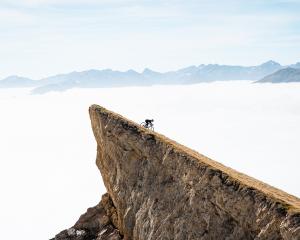Two Queenstown climbers flown off Mt Tasman on Wednesday had faced a difficult ''judgement call'' and do not deserve criticism, an alpine rescue leader says.
Queenstown-based Alpine Cliff Rescue Team co-leader Chris Prudden said yesterday most climbers called for rescue services only when they thought ''life and limb'' were in danger.
The pair have returned to the climbing area. Police would not confirm their identities to the Otago Daily Timesyesterday.
However, Mr Prudden said he knew one of the men to be a ''very strong, capable rock climber'', but relatively inexperienced in ice climbing.
The experience would have been a ''learning curve'' for the men.
The pair, aged 28 and 30, became stuck 50 metres below the summit of the 3497m mountain.
Police say the climbers decided snow conditions, warm weather and avalanche risk could prevent them from either reaching the summit or descending safely.
After calling emergency services by cellphone and activating a personal locator beacon (PLB), they were taken off the mountain by helicopter with the help of the Aoraki Mt Cook Rescue Team and Mt Cook Alpine Guides staff.
Mr Prudden said such rescues were the ''natural outcome of PLBs and the rescue system in place''.
Climbers knew they had a high chance of being rescued if they found themselves in ''a situation they didn't like''.
That conflicted with the traditional, purist approach to climbing: ''When you head off into the mountains, you take equipment, knowledge and experience, and the whole idea is to deal with come what may.''
The police would always respond to a request for help, and consider the merits of that request afterwards.
Even if it was deemed unnecessary in hindsight, the police did not charge for a rescue for fear of creating a disincentive for climbers to ask for help when it was really needed.
Avoiding that situation came down to making a correct assessment of the conditions, either before setting out on a climb or during one, he said.
Such assessments had stopped him climbing ''literally hundreds of peaks.'' Mr Prudden said.
Advertisement













